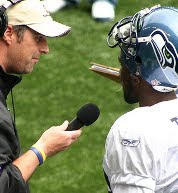Due to a slight problem I have been computer-less for the weekend. The weather and the arthritis were not conducive to gardening; and the library is still in such a state of flux that reading is somewhat guilt-ridden. I was therefore thrown on the mercies of the television.
Isn’t it strange, no matter how many channels one has to choose from, inevitably you end up on a sporting channel? I was able to gawp at football (soccer to you), Rugby League, Rugby Union, Australian Rules, Tennis, Cycling and Formula something or other Racing Cars – among other activities that I didn’t actually recognise.
In each and every case, men and women put themselves on the line, performing with determination and commitment; with skill and dexterity – right until someone shoved a microphone under their nose – and then they fell to pieces!
Inarticulate blathering; incomprehensible diatribes; modest mumblings and excited burbling – we had all this and more accompanied in many cases by bemused interviewers.
And even those who managed a few words of articulate discourse fell prey to that rampant vocal virus, the ‘um-ah germ’.
Perhaps I can suggest a slight change to their otherwise very effective training routine – the practice of impromptu speaking. It is inevitable that if you play sport at a professional level eventually someone is going to attempt to interview you – so make plans for that day and shine not only on the field, by also on the side lines!
Here’s my coaching suggestion for those occasions: First listen to what the interviewer is saying to you. Don’t look over his shoulder at the camera and freeze; don’t wave to your mate behind them – no just listen and look at them. Even professional sports journalist sometimes have a really hard time in creating a comprehensible question, so you might need all your attention to work out what they said!
Then pause for a moment of reflection. Ask yourself what you can say about the subject ( and even more importantly think about what you should not say) and when you have that in your mind work on this simple formula
• WHAT – that is what is the simple answer to the question
• HOW – if it is important to the answer explain how it happened
• WHY – if there is a reason for it, or an importance to it this is the ‘why’
For instance, I watched Wally Lewis (a Queensland Rugby League Legend) answer a question about a game his team lost. He was asked ‘What happened out there today Wally?’
His response was classic – ‘Quite simply we lost the game in the forwards – we didn’t have the drive needed to push through their defence; so we lost a number of scoring opportunities. And you can’t do that against a team of this calibre.’
See – simple! Or it will be if you practice it as well as the kicking, the pushing and shoving, the running and catching, the dropping and the picking up.
As you may have probably guessed this lady is not much of a sports fan – well not yet anyway. But soon we’ll be playing cricket for the ashes … and that is a very different story.
Michele @ Trischel

